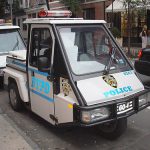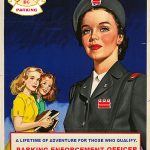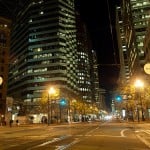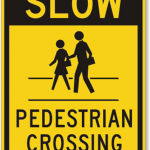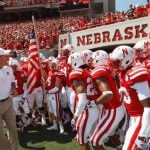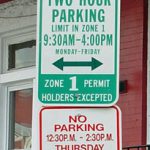Is Waze a threat to police officers?

This screenshot from Waze shows a few police cars near the user.
Some police officers are calling for Google to disable the enforcement-tracking features in its navigation and traffic app, Waze, claiming that it isn’t just dangerous for police, it also inhibits cops’ ability to catch speeders. The National Sheriffs’ Association, which had previously complained that the navigation app negatively impacts police safety, has extended its scope, stating that the app inhibits the use of speed traps.
Waze, which is owned by Google and bills itself as “the world’s largest traffic and navigation app,” is free and lets its reported 50-million users tag traffic congestion, accident locations, and coffee shops — as well as parked cop cars and traffic cameras.
Law enforcement initially spoke out against Waze after the deadly shootings of two New York City police officers in December. Ismaaiyl Brinsley, who killed the two officers, had posted a screenshot of Waze on Instagram, though investigators do not believe he had used the app in his attack, reported the Washington Post. Brinsley had thrown out his mobile phone at least two miles from the location of the murders.
Los Angeles Police Chief Charlie Beck brought the concerns to Google chief exec Larry Page earlier this month in a letter, writing: “I am concerned about the safety of law enforcement officers and the community, and the potential for your Waze product to be misused by those with criminal intent,” reported NBC Los Angeles. “I look forward to opening a dialogue with you as to how Google can prevent the future misuse of the Waze app to track law enforcement officers, thereby avoiding any future deaths or injury.”
Now, certain officers and advocates are asking Google to remove the cop car- and camera-tagging features from the app, to prevent violence against police officers and to protect speed traps. Sheriff Mike Brown of Bedford County, Virginia, told the AP that states could pass laws to prevent people sharing the locations of parked police cars, though it is not clear that First Amendment protections would permit this.
The sheriffs’ group also claims that radar guns and other methods of speed enforcement reduce highway deaths. “This app will hamper those activities by locating law enforcement officers and puts the public at risk,” the association said, according to the Associated Press.
A spokeswoman for Waze, Julie Mossler, countered, saying that the app actually assists enforcement: “These relationships keep citizens safe, promote faster emergency response and help alleviate traffic congestion… Police partners support Waze and its features, including reports of police presence, because most users tend to drive more carefully when they believe law enforcement is nearby.”

Waze says that by letting motorists know where the congestion is, it helps traffic run more smoothly. Image from Diego Russo.
But cop cars aren’t invisible. If a cop car is parked on the street, and no one posts its location on Waze, does it still exist? Even enforcement isn’t unified on the issue. “We want to be seen,” San Jose Police Sgt. Heather Randol told the San Jose Mercury News, saying that “being highly visible on patrol” can lower crime. Higher police visibility can also aid the citizens cops are meant to protect: San Francisco Police spokesman Albie Esparza told the News that “[Waze] also helps with public safety so people know where there is an officer to get help.”
Related Posts
Category: Parking Tech











